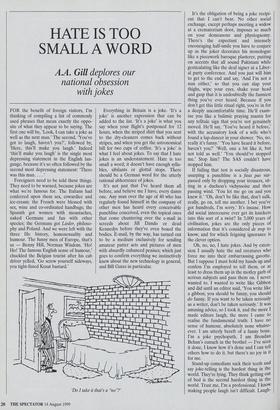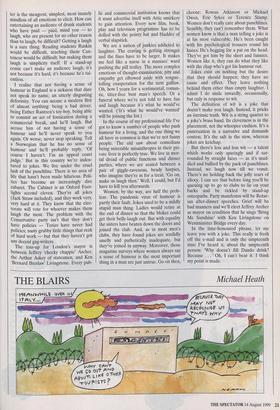HATE IS TOO SMALL A WORD
A.A. Gill deplores our
national obsession with jokes
FOR the benefit of foreign visitors, I'm thinking of compiling a list of commonly used phrases that mean exactly the oppo- site of what they appear to be saying. The first one will be, 'Look, I can take a joke as well as the next man.' The second, 'You've got to laugh, haven't you?', followed by, `Here, this'll make you laugh.' Indeed `this'll make you laugh' is the single most depressing statement in the English lan- guage, because it's so often followed by the second most depressing statement: 'There was this man. . . . '
Foreigners need to be told these things. They need to be warned, because jokes are what we're famous for. The Italians had conferred upon them sex, cowardice and ice-cream; the French were blessed with sex, wine and co-ordinated handbags; the Spanish got women with moustaches, naked Germans and fun with other species; the Germans got Lieder, philoso- phy and Poland. And we were left with the three Hs: history, homosexuality and humour. The funny men of Europe, that's us — Benny Hill, Norman Wisdom. 'Ho! Ho! The famous English sense of humour,' chuckled the Belgian tourist after his cab driver yelled, 'Go screw yourself sideways, you tight-fisted Kraut bastard.' Everything in Britain is a joke. 'It's a joke' is another expression that can be added to the list. 'It's a joke' is what you say when your flight's postponed for 12 hours, when the striped shirt that you sent to the dry-cleaners comes back without stripes, and when you get the astronomical bill for two cups of coffee. 'It's a joke' is what I feel about jokes. To say that I hate jokes is an understatement. Hate is too small a word; it doesn't have enough sylla- bles, sibilants or glottal stops. There should be a German word for the utterly rational abhorrence of jokes.
It's not just that I've heard them all before, and believe me I have, every damn one. Any man over the age of 40 who has regularly found himself in the company of other men has heard every conceivable punchline conceived, even the topical ones that come chuntering over the e-mail in screeds about Jill Dando or dead Kennedys before they've even boxed the bodies. E-mail, by the way, has turned out to be a medium exclusively for sending amateur patter acts and pictures of men with absurdly enhanced penises; which just goes to confirm everything we instinctively knew about the new technology in general, and Bill Gates in particular.
Do I take it that's a "no"?'
It's the obligation of being a joke recipi- ent that I can't bear. No other social exchange, except perhaps meeting a widow at a crematorium door, imposes so much on your demeanour and physiognomy. There's the expectant and intensely encouraging half-smile you have to conjure up as the joker decorates his monologue like a piecework baroque plasterer, putting on accents that all sound Pakistani while gesticulating like the deaf signer at a Liber- al party conference. And you just will him to get to the end and say, 'And I'm not a nun either,' so that you can slap your thighs, wipe your eyes, shake your head and gasp that it is undoubtedly the funniest thing you've ever heard. Because if you don't get this little ritual right, you're in for a deeply uncomfortable time. He'll exam- ine you like a bulimic praying mantis for any telltale sign that you're not genuinely moved. He'll say, 'You've heard it before,' with the accusatory look of a wife who's found a lap-dancer in your shower. 'No, no, really it's funny.' You have heard it before, haven't you?"Well, one a bit like it, but not told as well.' You should've stopped me.' Stop him? The SAS couldn't have stopped him.
If failing that test is socially disastrous, usurping a punchline is a faux pas sur- passed only by dropping your trousers, sit- ting in a duchess's vichyssoise and then passing wind. 'You let me go on and you knew it."Oh, don't be like that, don't sulk, really, go on, tell me another. I bet you've got hundreds, I'm sorry.' It's insane. How did social intercourse ever get its knickers into this sort of a twist? In• 3,000 years of civilisation, jokes are the only pieces of information that it's considered de trop to know; and for which feigning ignorance is the clever option.
Oh, no, no, I hate jokes. And by exten- sion I usually hate the sad creatures who force me into their embarrassing gavotte. But I suppose I must hold my hands up and confess I'm employed to tell them, or at least to dress them up in the motley garb of serious subjects and pass them on. I never wanted to. I wanted to write like Gibbon and did until an editor said, 'You write like a gibbon; you should be funny, you should do funny. If you want to be taken seriously as a writer, don't be taken seriously.' It was amusing advice, so I took it, and the more I made editors laugh, the more I came to realise the fundamental truth: I have no sense of humour, absolutely none whatso- ever. I am utterly bereft of a funny bone, I'm a joke psychopath, I am Brendan Behan's eunuch in the brothel — I've seen it done, I know how it's done and I can tell others how to do it, but there's no joy in it for me.
Stand-up comedians suck their teeth and say joke-telling is the hardest thing in the world. They're lying. They think getting out of bed is the second hardest thing in the world. Trust me, I'm a professional. I know making people laugh isn't difficult. Laugh- ter is the meagrest, simplest, most inanely mindless of all emotions to elicit. How can entertaining an audience of drunk students who have paid — paid, mind you — to laugh, who are present for no other reason than to laugh, be difficult? Getting a laugh is a sure thing. Reading students Ruskin would be difficult, teaching them Can- tonese would be difficult, but making them laugh is simplicity itself. If a stand-up comic can't make an audience laugh, it's not because it's hard, it's because he's tal- entless.
I realise that not having a sense of humour in England is a sickness that dare not speak its name, an utterly disgusting deformity. You can accuse a modern Brit of almost anything: being a bad driver, being Esther Rantzen's toy-boy, being able to commit an act of fornication during a commercial break, and he'll laugh. But accuse him of not having a sense of humour and he'll never speak to you again. Or worse, never stop speaking. Tell a Norwegian that he has no sense of humour and he'll probably reply, 'Of course I haven't. I'm an appeal court judge.' But in this country we're inden- tured to jokes. We live under the cruel lash of the punchline. There is no area of life that hasn't been made hilarious. Poli- tics has become an increasingly dire cabaret. The Cabinet is an Oxford Foot- lights second eleven. They're all jokes (Jack Straw included), and they work very, very hard at it. They know that the elec- torate will vote for whoever makes them laugh the most. The problem with the Conservative party isn't that they don't have policies — Tories have never had policies; nasty grubby little things that reek of hard work — but that they haven't got any decent gag-writers.
The toss-up for London's mayor is between Jeffrey 'cheeky chappie' Archer, the Arthur Askey of statesmen, and Ken `Bernard Breslaw' Livingstone. Every pub- lic and commercial institution knows that it must advertise itself with Attic smirkery to gain attention. Every new film, book, play and television programme has to be dolled with the pointy hat and bladder of verbal slapstick.
We are a nation of junkies addicted to laughter. The craving is getting stronger and the fixes have to be larger. It makes me feel like a nurse in a maniacs' ward pushing the pill trolley. The more complex emotions of thought-examination, pity and empathy get elbowed aside with tongue- lolling exasperation for the next guffaw. Oh, how I yearn for a sentimental, roman- tic, titter-free best man's speech. Or a funeral where we're not told to have fun and laugh because it's what he would've wanted. (It's what he would've wanted' will be joining the list.) In the course of my professional life I've got to know a number of people who push ,humour for a living, and the one thing we all have in common is that we're not funny people. The old saw about comedians being miserable misanthropes in their pri- vate lives is perfectly true. We live in mor- tal dread of public functions and dinner parties, where we are seated between a pair of giggle-ravenous, beady harpies, who imagine they're in for a treat. `Go on, make us laugh then.' Well, I could, but I'd have to kill you afterwards.
Women, by the way, are half the prob- lem. The pandemic virus of humour is partly their fault. Jokes used to be a mildly stupid man thing. Ladies would retire at the end of dinner so that the blokes could get their belly-laugh out. But with equality the sisters have beaten down the doors and joined the club. And, as in most men's clubs, they have found jokes are sordidly smelly and pathetically inadequate, but they've joined in anyway. Moreover, those magazine surveys where women always say a sense of humour is the most important thing in a man are just untrue. Go on then, choose: Rowan Atkinson or Michael Owen, Eric Sykes or Terence Stamp. Women don't really care about punchlines. Sensibly, they can't remember them. What women know is that a man telling a joke is at his most vulnerable. He's been caught with his psychological trousers round his knees. He's begging for a pat on the head. They've got him by the short and funnies. Women like it, they can do what they like with the chap who's got his humour out.
Jokes exist on nothing but the desire that they should happen; they have no cause and effect. They leave nothing behind them other than empty laughter. I admit I do smile inwardly, occasionally, but only in response to wit.
The definition of wit is a joke that doesn't make you laugh. Instead, it pricks an intrinsic truth. Wit is a string quartet to a joke's brass band. Its cleverness is in the placement, not the whoopee cushion. It's a punctuation in a narrative and demands context. It's the salt in the stew, whereas jokes are ketchup.
But there's less and less wit — a talent which works only sparingly and if sur- rounded by straight faces — as it's mud- died and bullied by the pack of punchlines. Instead, we laugh now till we vomit. There's no holding back the jolly tears of idiocy. I can see that before long you'll be queuing up to go to clubs to lie on your backs and be tickled by stand-up osteopaths. Party manifestos will be Rotar- ian after-dinner speeches. Grief will be bad manners and we'll elect Jeffrey Archer as mayor on condition that he sings 'Bring Me Sunshine' with Ken Livingstone on Westminister Bridge every day.
In the time-honoured phrase, let me leave you with a joke. This really is fresh off the e-mail and is only the umpteenth time I've heard it, about the umpteenth person: 'Why doesn't Jill Dando drink? Because . . ' Oh, I can't bear it. I think my point is made.



























































 Previous page
Previous page